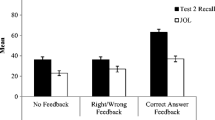Summary
In the performance prediction paradigm both a prediction of subjects' own memory performance (P) and their actual performance (A) are assessed. Prediction accuracy (PA) has been regarded as a measure of memory monitoring which in turn was assumed to be related positively to memory performance. A popular approach to test this metamemory hypothesis is based on correlations between measures of PA and of A. This approach is reexamined critically with regard to two classes of problems. The first is concerned with the definitions of at least six different PA measures represented in the literature. The second refers to statistical artifacts resulting from the part-whole character of the correlations between PA and A. Proceeding from the conclusion that a valid test of the metamemory hypothesis is not possible on the basis of correlations of PA and A, we propose an experimental procedure that properly permits the testing of the hypothesis that the utilization of monitoring activities during learning yields higher levels of memory performance.
Similar content being viewed by others
References
Bisanz, G. L., Vesonder, G. T., & Voss, J. T. (1978). Knowledge of one's own responding and the relation of such knowledge to learning: A developmental study. Journal of Experimental Child Psychology, 25, 116–128.
Brown, A. L., Bransford, J. D., Ferrara, R. A., & Campione, J. C. (1983). Learning, remembering, and understanding. In J. H. Flavell & E. M. Markman (Eds.), Handbook of child psychology. Vol. 3: Cognitive development (4th ed.) (pp. 77–166). New York: Wiley.
Butterfield, E. C., Nelson, T. O., & Peck, V. (1988). Developmental aspects of the feeling of knowing. Developmental Psychology, 24, 654–663.
Cohen, J., & Cohen, P. (1983). Applied multiple regression/correlation analysis for the behavioral sciences (2nd ed.). Hillsdale, NJ: Erlbaum.
Flavell, J. H. (1981). Cognitive monitoring. In W. P. Dickson (Ed.), Children's oral communication skills (pp. 35–60). New York: Academic Press.
Flavell, J. H., Friedrichs, A., & Hoyt, J. (1970). Developmental changes in memorization processes. Cognitive Psychology, 1, 324–340.
Flavell, J. H., & Wellman, H. M. (1977). Metamemory. In R. V. Kail & J. W. Hagen (Eds.), Perspectives on the development of memory and cognition (pp. 3–33). Hillsdale, NJ: Erlbaum.
Gigerenzer, G. (1981). Messung und Modellbildung in der Psychologie. Munich: Reinhardt, UTB 1047.
Gronninger, L. D. (1979). Predicting recall: The “feeling-that-I-will-know” phenomenon. American Journal of Psychology, 92, 45–58.
Hasselhorn, M. (1986). Differentielle Bedingungsanalyse verbaler Gedächtnisleistungen bei Schulkindern. Frankfurt/M.: Lang.
Hasselhorn, M. (1987). Altersunterschiede in der Einschätzung eigener Gedächtnisleistungen bei Kindern. Paper presented at the 8th, biennial meeting of German speaking developmental psychologists, September 13–16, Bern, Switzerland.
Hasselhorn, M., Hager, W., & Baving, L. (1989). Zur Konfundierung metakognitiver und motivationaler Aspekte im Prädiktionsverfahren. Zeitschrift für experimentelle und angewandte Psychologie, 36, 31–41.
Hasselhorn, M., Hager, W., & Möller, H. (1987). Metakognitive und motivationale Bedingungen der Prognose eigener Gedächtnisleistungen. Zeitschrift für experimentelle und angewandte Psychologie, 34, 195–211.
Levin, J. R., Yussen, S. R., DeRose, T. M., & Pressley, M. (1977). Developmental changes in assessing recall and recognition memory capacity. Developmental Psychology, 13, 608–615.
Lovelace, E. A. (1984). Metamemory: Monitoring future recallability during study. Journal of Experimental Psychology: Learning, Memory, and Cognition, 10, 756–766.
Pressley, M., Levin, J. R., Ghatala, E. S., & Ahmad, M. (1987). Test monitoring in young grade-school children. Journal of Experimental Child Psychology, 44, 96–111.
Schneider, W. (1988). Conceptual and methodological problems in doing self-regulation research. Paper presented at the annual meetings of the American Educational Research Association, New Orleans, 1988.
Schneider, W., Borkowski, J. G., Kurtz, B. E., & Kerwin, K. (1986). Metamemory and motivation: A comparison of strategy use and performance in German and American children. Journal of Cross-Cultural Psychology, 17, 315–336.
Stelzl, I. (1982). Fehler und Fallen der Statistik. Bern: Huber.
Westermann, R. (1987). Strukturalistische Theorienkonzeption und empirische Forschung in der Psychologie. Berlin: Springer.
Wippich, W. (1981). Verbessert eine Einkaufssituation die Vorhersage der eigenen Behaltensleistungen im Vorschulalter? Zeitschrift für Entwicklungspsychologie und Pädagogische Psychologie, 13, 280–290.
Author information
Authors and Affiliations
Rights and permissions
About this article
Cite this article
Hasselhorn, M., Hager, W. Prediction accuracy and memory performance: Correlational and experimental tests of a metamemory hypothesis. Psychol. Res 51, 147–152 (1989). https://doi.org/10.1007/BF00309310
Received:
Issue Date:
DOI: https://doi.org/10.1007/BF00309310




